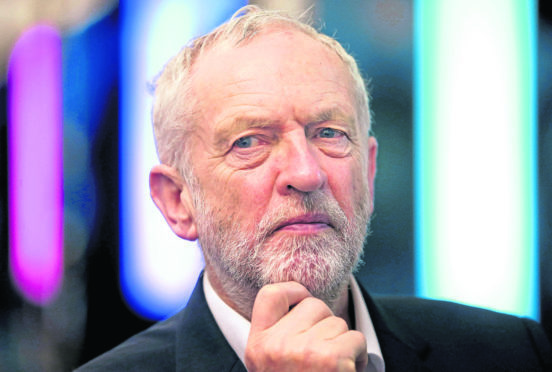There are three people in this marriage” said the Lady Diana, showing an ability to gain headlines, tell the truth and count. For a long time the British electorate have yearned for the luxury of three options on Brexit – they’ve had to make do with one.
The old marriage of British politics – Labour versus Tory, one idea set against an alternative – died on the day of Brexit. A surprising popular vote left politicians clueless as to what the people thought, and they have since struggled to divine the popular will. Our national debate collapsed into confusion.
Labour lost the ability to make headlines, tell the truth or even count – look at those static poll figures. It appeared the leader, Jeremy Corbyn, was for Brexit while the leader of the Brexiting government, Theresa May, was against. It now seems that Corbyn will not oppose a second referendum, but will not push for one. Meanwhile May is keen never to hear from the people again. A choice is emerging where there has been muddle.
Labour gathered in Liverpool like a budget version of the Exotic Marigold Hotel. Veteran political thesps talking about piles. They leave in better shape – in place of strife they have found some unity.
“Sturgeon has yet to make a serious mark on the Brexit process”
John McDonnell had to deny plotting against leader Corbyn before announcing workers would own chunks of private companies should Labour come to power. Revolutionary stuff, met with barely a squeal from the right wing commentators. Brexit seems to have sapped the fight from the Tory press. That, or nobody thinks Labour will come to power.
On the great issue of the age, McDonnell said there could be a “people’s vote”, but only on the terms, not on the principle. Brexit spokesman Keir Starmer contradicted this the following day, saying voters should be allowed to pick Remain and be done with this nightmare.
Yesterday’s leader’s speech by Jeremy Corbyn was a good one. He was strong on the party’s anti-racist tradition. He condemned ugly capitalism and “called time’ on the “racket” of outsourcing. He echoed John McDonnell’s workers’ ownership plans, but the rest was middle-of-road social democratic stuff about early years, triple-lock pensions and a green revolution.
“We all hoped Brexit would protect jobs,” he said, claiming the only job that mattered to Theresa May was her own. He sought to paint a picture of a Brexit betrayed – not the advertised one of milk and honey, but one curdling in the sweaty palms of an incompetent government and ideologically driven party.
Include a customs union and no hard border in Ireland and he’d support Brexit. Don’t, and he won’t. That said, it is not entirely clear what Labour’s Brexit policy is – Corbyn said he would oppose the Chequers plan and any no-deal exit and demand a general election. But he wouldn’t then call for a referendum – and May has already rejected any new election.
Thus Labour has said – if someone else gets a referendum together, it won’t oppose, but nor will it actively advocate one. I’m not sure this will hold. It appears indecisive. The conference had given the impression of being for a second vote . . . and then back-tracked.
Which brings us to the person who wants to be the third party in the marriage – Nicola Sturgeon. Leading the second-largest party, by membership, in the UK and openly against Brexit from the outset, she has yet to make a serious mark on the Brexit process.
Sturgeon has played a strong hand in domestic policy, identifying the problems that need to be fixed. Ironically it is the constitution that has got away from her.
Nicola Sturgeon resists a second referendum on Brexit for fear it will set a precedent. If voters can rethink a mandate to leave the EU, then a rethink on any independence terms for Scotland would be legitimate.
Her call for Indyref in 2017 was daft – at the wrong time, with no new arguments. It acted like a sugar rush on the faithful who were only just coming down. She is letting Brexit get the better of her too. Not wishing to set a precedent for any future indy decision and not wanting to alienate pro-Brexit indy voters, she is letting the country down.
>> Keep up to date with the latest news with The P&J newsletter
It is clear the only way Brexit can be checked is to vote on it. If Sturgeon opts for a second referendum she will win support in Scotland, and appear more decisive than Labour.
In rescuing Britain from this folly, Sturgeon could fundamentally shift the perception of indy. No longer a grievance charter but a prudent strategic choice. People who have never trusted the SNP or the facts of indy would see it more favourably. If Sturgeon has the wisdom and courage to resist Brexit, then maybe her indy schemes are also rooted in the same values. Indy not as an obsession, but a pragmatic response to circumstances.
Let us have three options in our political debate before we head into this messiest of divorces.

